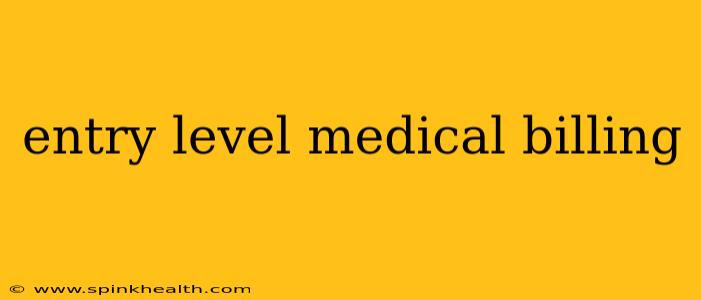The world of healthcare is vast and complex, but behind the scenes, a critical function keeps it all running smoothly: medical billing. If you're detail-oriented, organized, and fascinated by the intricate workings of healthcare finance, an entry-level medical billing position might be the perfect launchpad for your career. This isn't just about numbers; it's about ensuring doctors and healthcare facilities get paid for the vital services they provide, allowing them to continue caring for patients. Let's delve into the world of entry-level medical billing and unravel what it takes to succeed.
What Does an Entry-Level Medical Biller Do?
Imagine being the translator between doctors' offices, hospitals, and insurance companies. That's the essence of an entry-level medical biller's role. It's a job that combines meticulous attention to detail with a knack for problem-solving. Your daily tasks might include:
- Preparing and submitting claims: This involves accurately entering patient information, procedure codes (CPT codes, HCPCS codes), and diagnosis codes (ICD codes) into billing software. Accuracy is paramount here – even a minor mistake can delay or prevent payment.
- Following up on claims: Insurance companies can be slow, so you'll be tracking the status of submitted claims, identifying and resolving any denials or rejections.
- Posting payments and adjustments: When payments come in (or adjustments need to be made), you'll meticulously record them in the billing system, ensuring the patient's account is updated accurately.
- Managing patient accounts: You'll handle patient inquiries regarding their bills, explaining charges and payment options.
- Maintaining organized records: Medical billing requires meticulous record-keeping, ensuring compliance with HIPAA regulations and internal policies.
What Skills Do I Need for Entry-Level Medical Billing?
While formal education isn't always required, several key skills will make you a strong candidate:
- Strong attention to detail: Accuracy is crucial. One incorrect digit can lead to a denied claim.
- Proficiency in medical terminology: Understanding medical terms and abbreviations is essential for accurate coding.
- Computer skills: Familiarity with billing software and other computer applications is a must.
- Organizational skills: You'll be managing numerous accounts and claims simultaneously.
- Communication skills: You'll interact with patients, insurance companies, and colleagues.
- Problem-solving abilities: You'll need to troubleshoot issues with claims and patient accounts.
How Can I Get an Entry-Level Medical Billing Job?
The path to your first medical billing role can vary. Some employers prefer candidates with a certification, while others prioritize relevant experience or a strong aptitude. Consider these avenues:
- Medical billing and coding certification: A certification (such as Certified Professional Coder or Certified Billing and Coding Specialist) can boost your resume and demonstrate your commitment to the field.
- On-the-job training: Many healthcare facilities offer on-the-job training for entry-level billing positions.
- Associate's degree: An associate's degree in healthcare administration or a related field can provide a strong foundation.
What is the Salary for Entry-Level Medical Billing?
Salaries vary depending on location, experience, and employer. However, entry-level medical billers can expect a competitive starting salary, with potential for growth as they gain experience and expertise.
What are the Career Advancement Opportunities in Medical Billing?
An entry-level position is often a stepping stone to a rewarding career path. As you gain experience, you could advance to roles such as:
- Senior Medical Biller: Taking on more responsibility and mentoring junior staff.
- Medical Billing Supervisor/Manager: Overseeing a billing team and ensuring efficiency.
- Medical Billing Specialist: Specializing in a particular area, such as a specific type of insurance.
Is Medical Billing a Good Career Path?
If you're detail-oriented, enjoy problem-solving, and have a passion for healthcare, medical billing can be a highly rewarding career. The field offers job security, opportunities for advancement, and the satisfaction of playing a crucial role in the smooth operation of the healthcare system. The demand for skilled medical billers remains consistently high, ensuring career stability in a constantly evolving healthcare landscape.
This journey into medical billing may seem daunting at first, but with dedication, the right skills, and a passion for precision, you can unlock a fulfilling and stable career. Remember, it's not just about numbers; it's about ensuring healthcare providers can continue their vital work.

